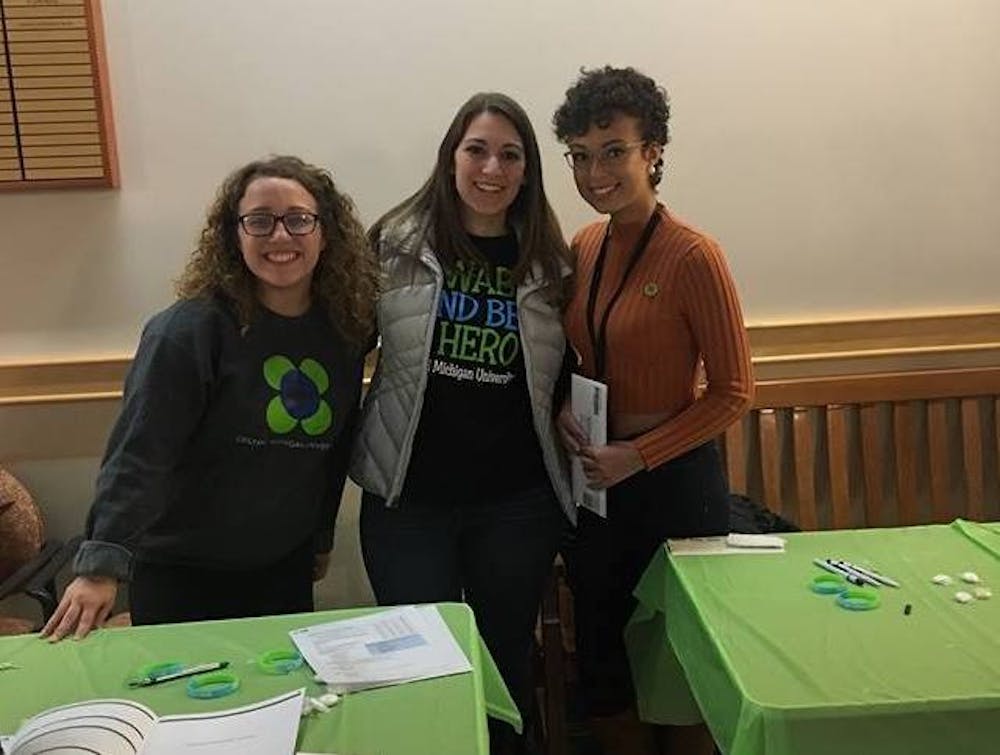Organization on campus saves lives by expanding bone marrow registry

Corinne Bass was a perfectly healthy 16-year-old. But one day, years ago, she woke up with red dots all over her body.
“We went to the hospital, got a blood draw and then everything just spiraled really fast,” Bass said.
For the next two-plus years, the Manistee sophomore would be living in and out of the hospital. The doctors said she had aplastic anemia, a disease caused by bone marrow failure. After receiving chemotherapy, she found out she needed a bone marrow transplant as soon as possible.
“The only way to cure my illness was a transplant,” she said.
At age 17, Bass found a match on the bone marrow registry. It saved her life.
Now, Bass has become a bone marrow transplant advocate at Central Michigan University. She is the president of the Be the Match registered student organization on campus. Her organization helps to educate the student body about the importance of bone marrow transplants, and expand the national registry of donors to save lives.
Every year, 17,500 people in the United States are diagnosed with a life-threatening illness, and their best treatment option is a bone marrow transplant, according to the U.S. Department of Health and Human Services. These patients could have anything from leukemia, lymphoma and other diseases.
In order for these patients to receive bone marrow transplants, they must find a donor that closely matches their human leukocyte antigen, which are proteins found on most cells in your body.
Because there are so many variables within a person’s HLA sequence, it can be incredibly difficult for patients to find a match, especially among ethnic groups. For example, African-American patients find an unrelated donor only 25 percent of the time. Usually, family members test to see if they match, but only 30 percent of patients who need a bone marrow transplant have a matching donor in their families. The remaining 70 percent must hope that a compatible stranger can be found using the national registry.
“You just have to live in limbo, and hope that you have a match,” Bass said.
Each year, at least 3,000 people in the United States die because they cannot find a matching donor.
This is where organizations, like Be the Match at CMU, come in — it educates students on the importance of donating bone marrow and giving them the resources to get on the registry to save lives.
“We help people that have been impacted by cancer, which is really everybody,” Bass said.
Bass finds joy in being able to share her experience and reassure those who have gone through similar circumstances.
“I often thought ‘I’m gonna die and I’m not going to make it through this’ and then I made it,” Bass said.
Samantha Pankey, vice president of Be the Match at CMU, knows how important their cause is.
“I think it’s really cool that we’re directly saving people’s lives,” she said. “The people who register are directly saving lives.”
Before the 2018-19 school year, CMU’s Be the Match foundation focused on blood drives and tables in the library and the UC, putting passersby who showed interest on the registry on the spot.
However, Bass said that more than half of the people who signed up to donate would cancel after they got a call about being a match. That became a problem because the patient is the first one to know that they are a match with someone on the registry. Then, someone has to go back to the patient and give them the bad news.
To solve this, Be the Match decided to start giving presentations to groups of students to raise awareness about dedication and commitment.
“If people are genuinely interested, and they don’t just feel pressured to join because it’s on the spot, they can inquire more about it and we can help them to join the registry,” Bass said.
Over the course of two years, Be the Match has helped almost 1,000 CMU students join the registry.
The Be the Match chapter at CMU began in support of Derrick Nash, a running back on the CMU football team, who died in 2015 after his second bout with Leukemia at age 20. Nash’s passing rocked CMU’s campus and inspired students to act.
Decolia Monroe, the founder of the Derrick Nash Strong Foundation, a non-profit organization that aims to help mortgage needs of families with acute or chronically ill children, teamed up with Be the Match to raise awareness before the foundation was formed.
“Be the Match is a great avenue for people who are in need for donations,” Monroe said in a statement. “Blood and bone marrow banks need donations from all demographics and organizations like Be the Match is doing a great service for those who need it.”
CMU’s Be the Match group meets every other Tuesday in 211E Park Library. The group can be contacted through its Facebook page Be the Match at CMU or on Instagram @bethematchcmu.





